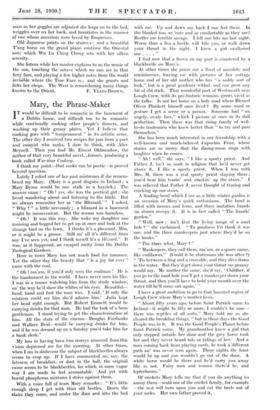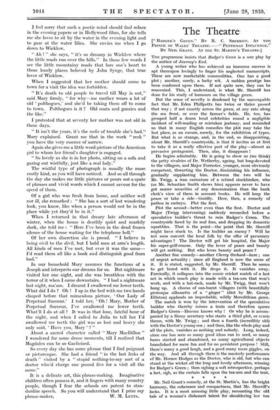Mary, the Phrase-Maker
IT would be difficult to be romantic in the basement of a Dublin house, and difficult too to be romantic while continually cooking other people's dinners, and washing up their greasy plates. Yet I believe that -cooking goes with " temperament " in its artistic sense. The other day I received two recipes for jam from a poet and essayist who ranks, I dare to think, with Alice Meynell. Then you find Mr. Ernest Oldmeadow, the author of that very beautiful novel, Antonio, producing a book called War-time Cookery.
I think my point—that cooks can be poetic—is proved beyond question.
• Lately I asked one of her past mistresses if she remem- bered my Mary. (Mary is a good disguise in Ireland ; a Mary Byrne would be one stalk in a hayrick.) The answer came : " Oh ! yes, she was the poetical girl ; she loved wandering about and listening to the birds. But we always remember her as the Blizzard.'" I asked, " Why ? " a little nervously ; a blizzard in a basement might be inconvenient. But the reason was harmless.
" Oh ! It was this way. She woke my daughter one -morning and begged her to get up at once and look at the strange bird on the lawn. I thinks it's a pheasant, Miss, or it might be a grouse. Still an' all it's different from any I've seen yet, and I think meself it's a blizzard." It was, as it happened, an escaped rarity from the Dublin Zoological Gardens.
Here in town Mary has not much food for romance. Yet the 'other day the beauty that "is a joy for ever" came- with the coal. • " Oh ! ma'am, if you'd only seen the coalman ! He is the handsomest in the world. I have never seen his like. I was in a trance watching him from the study window, an' the way he'd show the whites of his eyes. Beautiful— head, hand and foot the man was. I said, 'If only the mistress could see him she'd admire him.' Julia kept her head right enough. But Robert Emmett would be carrying drinks for that man. He had the look. of a born gentleman. I stood trying to get the characterization of him. All the stars of the cinema—Douglas Fairbanks and Wallace Reid—would be carrying drinks for . him, and if he was dressed up on a Sunday you'd take him for a bank clerk."
My loss in having been two storeys removed from this .vision depressed me for the morning. At other times, when I am in disfavour the subject of blackbeetles always . seems to crop up. If I have commented on, say, the lateness of breakfast, or dust in the hall, the original . cause seems to be blackbeetles, for which in some vague way I am made to feel accountable. And yet with • horrid phosphorus mixtures I strive against them.
With a voice full of tears. Mary remarks : "It's little -enough. sleep I .get , with .thim old beetles. Down the èiaijjTthçcomé, and under the.acior and inio the bed with me. Up and down my back I can feel them. In the blanket too, so 'cute and so comfortable as they are! Beetles are terrible savage. I felt one bite me last night. Worse than a flea a beetle will bite you, or walk down your throat in the night. I knew a girl swallowed one. . .
I find now that a frown on my part is countered by a blackbeetle on Mary's.
At other times she pours out a flood of anecdote and reminiscence, leaving me with pictures of her cottage home and of her old mother who has "a saddy sort of look," but is a great gardener withal, and can grow any .bit of old stick. That wonderful part of Westmeath near Lough Crew, with its pre-historic remains, grows vivid as she talks. Is not her home on a holy road where Blessed Oliver Plunkett himself once lived ? By some word or gesture I get a scene or a person. Someone had "nit angely, ovaly face," which I picture at once in its dull perfection. Then there was that rising family of well- to-do tradesmen who knew better than "to try and pass themselves."
She has been much interested in our friendship with a well-known and much-beloved Capuchin Friar, whose stories are so merry that the dining-room rings with laughter when he comes.
Ah ! well," she says, " I like a sporty priest. And Father J. isn't so sunk in religion that he'd never get above it. I like a spotty priest. When I was with Mrs. M. there was a real sporty priest staying there ; you'd hear him tearin' and crackin' up the stairs." I was relieved that Father J. never thought of tearing and cracking up our stairs.
A floating bowl which I use as a little winter garden is an occasion of Mary's quick enthusiasm. The bowl is filled with mosses and ferns, and three imitation lizards on stones occupy it. It is in fact called "The lizards' garden."
"Well, now ; isn't that the living image of a marl hole ? " she exclaimed. "To goodness I'd think it was one, and the three mankeepers just where they'd be on the banks."
"The three what, Mary ? "
" Mankeepers, they call them, ma'am, or a quare name, like cudilawns." (Could it be cluricauns she was after ?) " 'Tis between a frog and a crocodile, and they dive down in the water. But they'd get clown your throat me granny would say. Me mother the same, she'd say, Childher, if you go to the marl hole you'll get a inankeeper down your throat, and then you'll have to hold your mouth over the water till he'll come out again.'" I have a great ambition to go to that haunted region of Lough Crew where Mary's mother lives.
"About fifty years ago, before Saint Patrick came to Ireland--it might be fifty or more, I couldn't be sure— there was reptiles of all sorts," Mary told me as she cleared the breakfast things, "but in those days the Good People was in it. It was the Good People's Planet before Saint Patrick came. My grandmother knew a girl that only stepped outside her door and the grey horse took her and they never heard tale or tidings of her. And a man coming back from playing cards, he took a different path an' was never seen again. Those nights the hunt would be up and you wouldn't go out of the door. A white horse would be there and he'd carry you away like as not. Fairy' men and women there'd be, and leprechauns."
Of crickets Mary tells me that if you do anything to annoy them—scald one of the cricket family, for example —the rest will turn upon you and eat the heels out of your socks. Her own father proved it.. I feel sorry that such a poetic mind should find solace in the evening papers or in Hollywood films, for she tells me she loves to sit by the water in the evening light and to gaze at the water lilies. She envies me when I go down to Wicklow.
" Ah ! " she says, "it's so dreamy in Wicklow where the little roads run over the hills." In those few words I see the little mountainy roads that lure one's heart to those lonely places beloved by John Synge, that true lover of Wicklow.
When I suggested that her mother should come to town for a visit the idea was forbidden.
"It's death to old people to travel till. May is out," said Mary firmly, "for why—me mother wears a lot of old polthogues,' and she'd be taking them off to come to town. Polthogues is it ? Old coats and ganzies and the like."
I protested that at seventy her mother was not old in these days.
" It isn't the years, it's the reeks of trouble she's had.!' Mary explained. Grant me that in the work " reek " you have the very essence of sorrow.
Again shegives me a little word-picture of the American girl to whom her friend's daughter is engaged.
"So lovely as she is in her photo, sitting on a sofa and gazing out wistfully, just like a real lady."
The wistful type of photograph is usually the more costly kind, as you will have noticed. And so all through the day she makes me little pictures or pours out a spate of phrases and vivid words which I cannot savour for the speed of them.
Of a girl who was fresh from home, and neither well nor ill, she remarked : "She has a sort of lost wondering look, you know, like when a person would not be in the place while yet they'd be in it."
When I returned in that dreary late afternoon of winter, when the house is deathly quiet and murkily dark, she told me : "Here I've been in the dead frozen silence of the house waiting for the telephone bell."
Of her own discretion she is proud. "I believe in being civil to the divil, but I hold men at arm's length.
All kinds of men I've met, but ever it was the same— I'd read them all like a book and distinguish good from bad."
In our household Mary assumes the functions of a Joseph and interprets our dreams for us. But nightmare visited her one night, and she was breathless with the terror of it when I came downstairs. "I had a nightmare last night, ma'am. I dreamt I swallowed me lower teeth.
What did I do ? Oh! I up in the bed with me two hands clasped before that miraculous picture, 'Our Lady of Perpetual Succour.' I told her, 'Oh! Mary, Mother of Perpetual Succour, I've swallowed me lower teeth. What'll I do at all ? It was in that lone, fateful hour of the night, and when I called to Julia to tell her I'd swallowed me teeth the girl was so lost and heavy she only said, Have you, Mary ' ? "
About a sacred character called "Mary MaeDillon " I wondered for some dense moments, till I realized that Magdalen can be so Gaelicized.
So every day she has some phrase that I find poignant or picturesque. She had a friend "in the last links of death" visited by a "stupid nothing-to-say sort of a doctor who'd charge one pound five for a visit all the same."
It is a delicate art, this phrase-making. Imaginative children often possess it, and it lingers with many country people, though I fear the schools are potent to stan- dardize speech. So you will understand that I prize my



















































 Previous page
Previous page